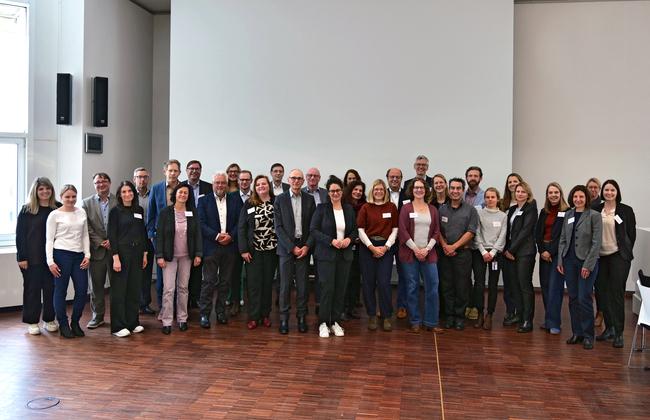2025 Annual Meeting: Dialogue Between the Paul-Ehrlich-Institut and the Pharma Deutschland Association
On 28 October 2025 the annual meeting between experts from the Paul-Ehrlich-Institut (PEI), the Federal Institute for Vaccines and Biomedicines, and representatives and member companies of the Pharma Deutschland association took place. In addition to an overview of the regulatory activities of the Paul-Ehrlich-Institut, this year's meeting focused on the Medical Research Act (Medizinforschungsgesetz, MFG), the implementation of the EU Regulation on substances of human origin (SoHO), the topic of artificial intelligence, and drug safety and authorisation.
 Source: Paul-Ehrlich-Institut
Source: Paul-Ehrlich-Institut
At the start of the meeting, the President of the Paul-Ehrlich-Institut, Professor Stefan Vieths, gave an overview of the Paul-Ehrlich-Institut's authorisation and consultancy services and of developments regarding clinical trials in Germany. He reported that a total of 809 clinical trial applications were submitted in Germany in 2024, including 351 applications in the field of vaccines and biomedicines. Germany will take on the highest number of clinical trial approval procedures as Reporting Member State (RMS) in 2025.
Implementation of the Medical Research Act
The Paul-Ehrlich-Institut also reported on the current status of implementation of the Medical Research Act (Medizinforschungsgesetz, MFG), which came into force on 30 October 2024. The MFG aims to increase Germany's attractiveness as a location for the development of innovative medicines and medical research. The two federal authorities, the Paul-Ehrlich-Institut, Federal Institute for Vaccines and Biomedicines, and the Federal Institute for Drugs and Medical Devices (Bundesinstitut für Arzneimittel und Medizinprodukte, BfArM) work closely together to make regulatory procedures more efficient through harmonisation, for example, and to make them more accessible for pharmaceutical companies.
Variety of Topics in the Annual Meeting: From Artificial Intelligence to SoHo
Another topic discussed at the meeting was the current status of the KIMERBA project, a research project funded by the Federal Ministry of Health (Bundesministerium für Gesundheit, BMG) and led by the Paul-Ehrlich-Institut to investigate the applicability of artificial intelligence (AI) in regulatory processes. Experts from the Paul-Ehrlich-Institut reported on the published results of the KIMERBA project. Other topics included the implementation of the new EU Regulation on substances of human origin (SoHO), scientific advice, clinical trials, and drug safety and authorisation.
The Paul-Ehrlich-Institut uses the annual exchange of experience and information with industry associations such as Pharma Deutschland to continuously develop and optimise its regulatory processes.



